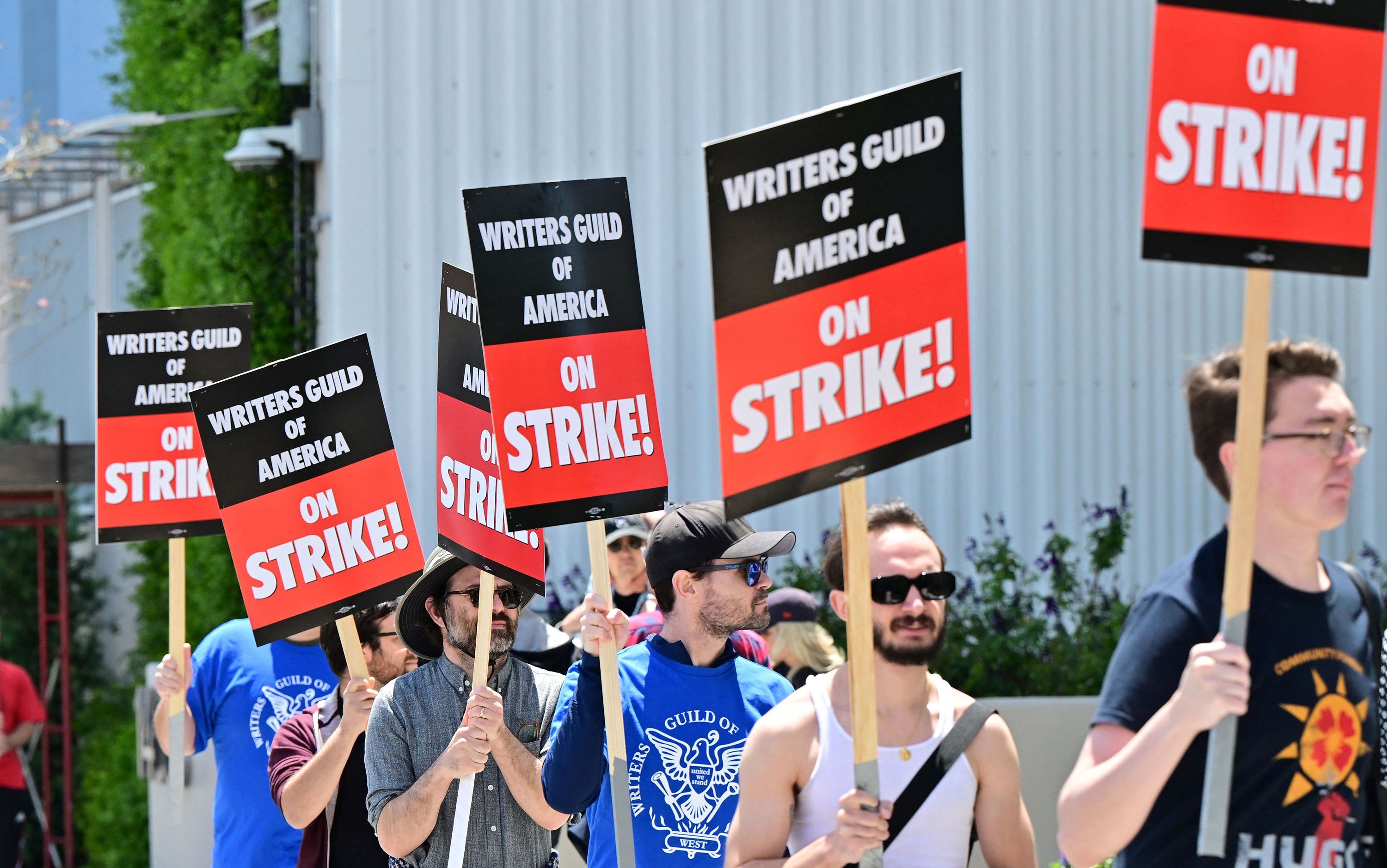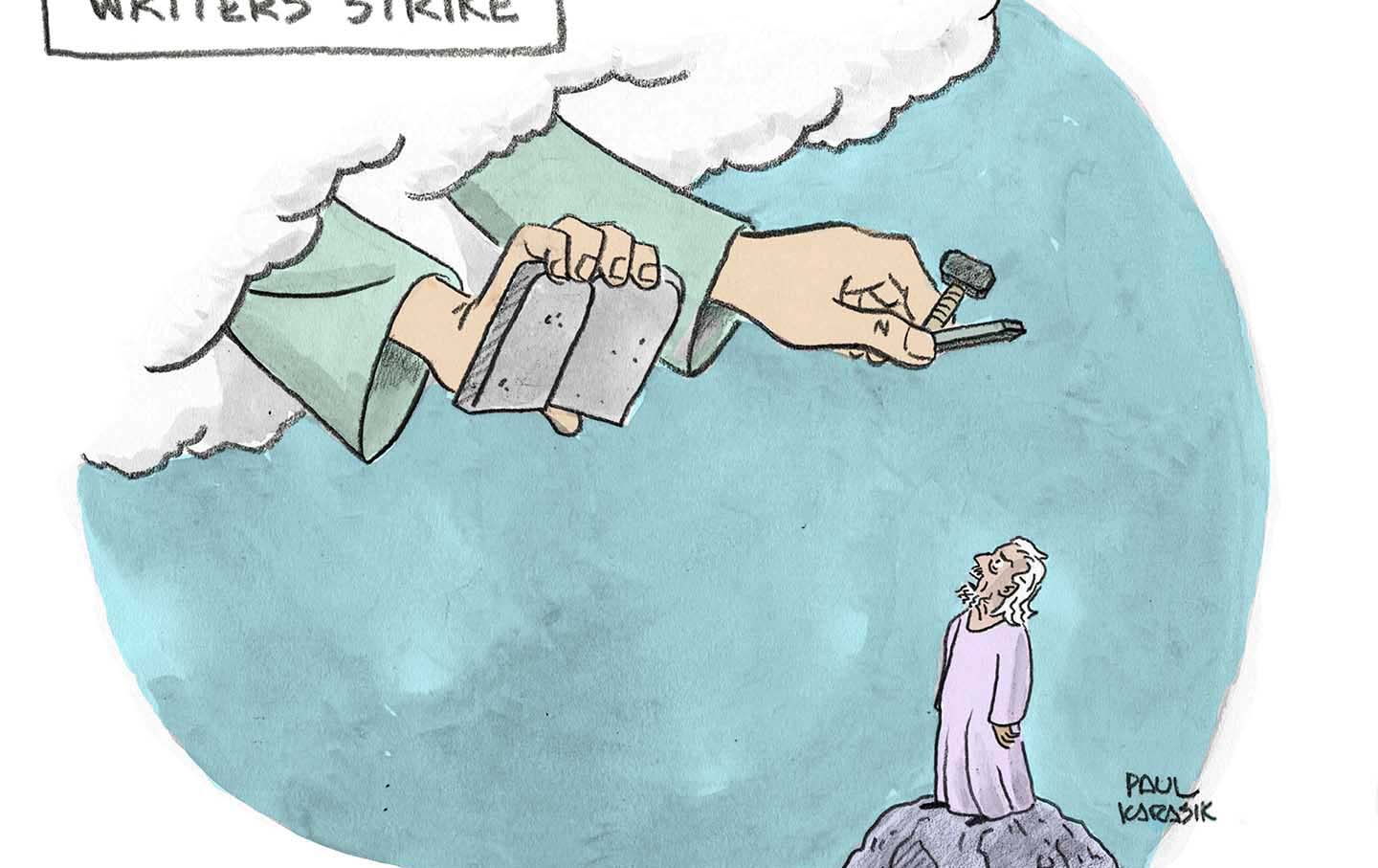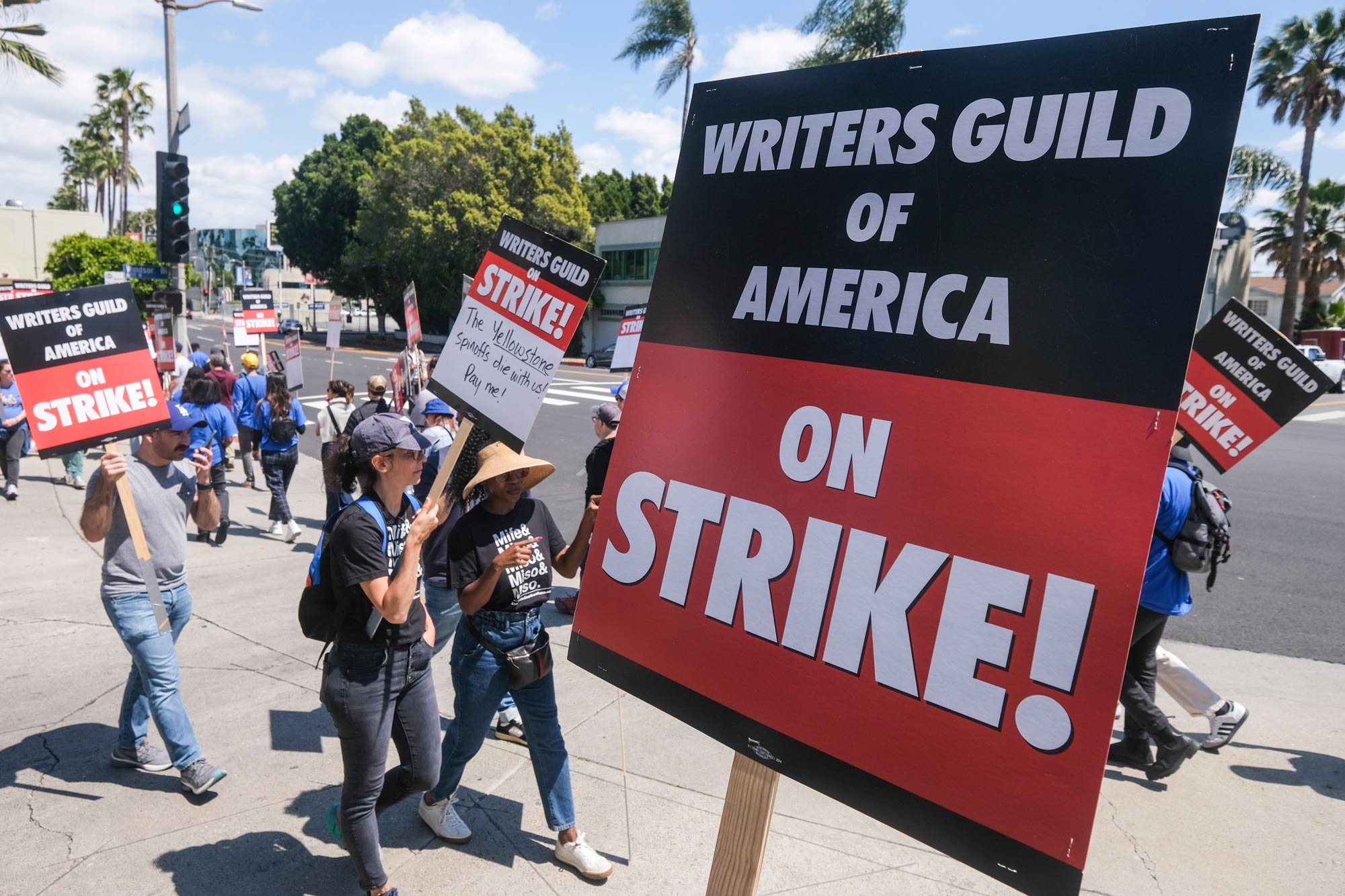Table of Contents
- Why the Writers Strike Matters to Everyone
- What Prompted the Writers Strike?
- Key Demands of the Writers
- AI and the Future of Writing
- The Impact on Shows and Movies
- What This Means for Viewers
- Looking Ahead: What Comes Next?
- Common Questions About the Writers Strike
- Final Thoughts on the Writers' Fight
Why the Writers Strike Matters to Everyone
The writers strike has truly shaken up the entertainment world, and, honestly, it touches more lives than you might first think. For a good long while, the people who create the stories we love decided to stop working.
When writers put down their pens, or keyboards rather, it sends ripples through studios, production teams, and, you know, even the folks who love watching their favorite shows. It's a big deal, really, because it changes what we get to see.
This whole situation is about the stories we enjoy, the shows we follow, and the people who make them happen, so it's a very important discussion for anyone who cares about entertainment.
What Prompted the Writers Strike?
The recent writers strike, which, as a matter of fact, captured a lot of attention, came about because of some big disagreements between writers and the companies that hire them. These companies include major studios and streaming services.
Writers felt their pay wasn't keeping up with the way the industry has changed, especially with streaming services becoming so popular. They pointed out that while these services grew, writer pay did not always grow with them.
They also wanted better conditions for their work, like more stable jobs and fairer deals for their creative efforts, you know. The way shows are made changed, and writers felt left behind by some of these new methods.
For instance, the rise of short-term writing jobs, sometimes called "mini-rooms," meant less steady work for many writers. This was a significant point of concern for them, and, frankly, it showed a shift in how creative projects were staffed.
The core of the issue was about getting a fair share of the profits that their writing helped to create. They believed the current system was not giving them enough, especially when shows became big hits, which, you know, takes a lot of their effort.
This dispute, you see, was not just about money. It was also about respect for the craft and ensuring that writing remains a viable career for talented people. The writers felt their contributions were being undervalued in a rapidly changing media landscape.
They wanted to make sure that as new ways of making and showing content came about, the people who wrote the stories were not left out of the benefits. This was a central part of their fight, and, essentially, it was about their future.
Key Demands of the Writers
The people who write for TV and movies had some pretty clear things they wanted, which, honestly, seemed quite reasonable to many. Their main requests aimed to fix problems they saw in the modern entertainment business.
- They sought better minimum pay for their work, arguing that what they earned wasn't enough to live on, especially in expensive places like Los Angeles. Writers felt that their starting pay had not kept pace with the cost of living.
- They wanted bigger contributions to their health and pension plans, which, like, helps them feel secure for the future. These benefits are very important for writers, as their work can be unsteady.
- A big part of their concern was about "mini-rooms," where a few writers work on a show for a short time, often without a guarantee of continuing on the project. They wanted these to be more structured and provide more consistent work, ensuring writers had enough to do for longer periods.
- Another point was about residuals, the payments writers get when their shows are rerun or streamed. With streaming, these payments had gone way down, so they wanted a fairer share. They argued that a hit show watched by millions on a streaming service should pay writers more than it currently did.
- They also pushed for better staffing on shows, meaning more writers working for longer periods on a project. This would allow for better story development and more stable employment for writers, you know.
- Another demand was about the length of time writers are guaranteed to work on a show. They wanted a longer commitment from studios, which would give them more job security.
These demands, you see, were about getting a fair piece of the pie as the entertainment world changed so much. Writers wanted to ensure their profession remained a sustainable path for creative individuals, and, truly, it was a fight for their livelihoods.
They felt that the companies were making a lot of money from their work, but the writers themselves were not seeing enough of that success. This was, basically, the core of their argument.
The writers also wanted more transparency from studios about how their shows performed on streaming platforms. This information, they believed, would help them negotiate better deals in the future, and, frankly, it made a lot of sense.
AI and the Future of Writing
A really big topic during the writers strike was the rise of artificial intelligence, and, quite frankly, it made many writers feel uneasy. The idea of machines writing stories brought up serious questions about their jobs.
Writers worried that AI could be used to write scripts or parts of scripts, which would mean fewer jobs for human writers. They feared that studios might use AI to create first drafts, then hire human writers for much less money to polish them.
They wanted rules in place to make sure AI was used ethically and didn't take away their creative jobs, or, you know, diminish their role. They sought guarantees that AI would not be used to train on their work without permission or fair payment.
This concern highlights a larger discussion about technology's place in creative fields, and, essentially, how we protect human artistry. It's a question many industries are facing right now, and, truly, it's a big one.
The writers were looking for clear language in their contracts that would stop studios from replacing human writers with AI. They wanted to make sure that the unique spark of human creativity remained central to storytelling, which, you know, is pretty important.
They also wanted to make sure that if AI was used, it wouldn't be used to lower their pay or reduce the number of writing jobs available. This was a forward-thinking demand, as the technology is still quite new, and, basically, they wanted to get ahead of it.
The idea was to set a precedent for how creative work interacts with new technologies, ensuring that human talent is still valued and paid fairly. This aspect of the strike was, in some respects, about the future of work itself.
The Impact on Shows and Movies
The writers strike had a noticeable effect on what we see on our screens, and, naturally, it caused some delays across the entertainment world. The impact was felt almost immediately in many areas.
- Many TV shows had to stop production because there were no new scripts being written. This meant new seasons were pushed back, sometimes for many months. Fans had to wait much longer for their favorite stories to continue.
- Some movies also saw their release dates changed, as the writing process is a very early step in making a film. If the script wasn't ready, the whole production schedule would be thrown off, you see.
- Talk shows, which rely on daily writing, were among the first to go dark, which, frankly, was quite apparent. These shows need fresh jokes and monologues every single day, so they couldn't operate without writers.
- Other types of shows, like reality TV, were less affected because they don't rely on written scripts in the same way. However, even these shows might have writers for voiceovers or story structure, so there was still some impact.
- The strike also affected awards shows, with some being postponed or having their formats changed due to the lack of writers. This showed how deeply writers are involved in all parts of the industry.
The whole situation showed just how much the entertainment industry relies on writers, and, really, how vital their work is. Without them, the flow of new stories stops, and, basically, everything slows down.
Studios had to adjust their schedules and figure out what to do with projects that were in the middle of development. It was a challenging time for everyone involved, and, you know, it made a big impression.
The strike highlighted the essential role of writers in bringing stories to life, from the smallest joke to the grandest plot, and, truly, it made their importance clear to everyone watching.
What This Means for Viewers
For those of us who enjoy watching TV and movies, the writers strike meant a few things, and, actually, it was a bit frustrating at times. Our viewing habits changed because of it.
- Fewer new shows and movies came out, so there was less fresh content to watch. This meant re-watching old favorites or finding new things from outside the affected areas.
- Some favorite shows had shorter seasons or went on longer breaks between seasons than usual. This was a letdown for many fans who eagerly awaited new episodes, you know.
- It also brought attention to the people behind the stories, making many viewers think more about the creative process. People started to understand more about what writers do and why their work matters.
- Viewers also saw more unscripted content or older shows filling the gaps in TV schedules. This was a direct result of the lack of new written material.
- The strike sparked conversations among viewers about fair pay for artists and the future of entertainment. Many people on social media expressed support for the writers, which, frankly, was quite a sight.
It's a reminder that good stories don't just appear; they come from the hard work of writers, and, truly, their efforts matter a great deal. We saw firsthand what happens when those efforts are paused.
The experience gave audiences a different view of how their entertainment is made, showing the human element behind every show and movie. It was, in a way, a lesson for us all.
This period made many people appreciate the writers even more, understanding that their words are the very foundation of the stories we love. And, basically, it made us think about the whole system.
Looking Ahead: What Comes Next?
As the writers strike concluded, the industry began to pick up the pieces, and, honestly, there's a lot to consider for the future. The agreements made set new standards for how writers are paid and treated, especially with the growth of streaming and AI.
It's hoped that these changes will lead to a more stable and fair environment for writers, ensuring they can keep telling the stories we love, which, you know, is really important. The new contracts aim to address many of the concerns that led to the strike.
For instance, places like the Alabama Writers Forum, located at Bailey Building Suite 455, 400 S, could become even more significant gathering spots. Writers might meet there, perhaps on future dates like August 23, 2027, or July 24, 2028, to discuss how these new agreements are working out or to share their experiences. Such forums are vital for community building and ongoing discussions among writers.
The industry will now need to adapt to these new rules, which



Detail Author:
- Name : Chanel Gulgowski
- Username : gleannon
- Email : julia51@quigley.info
- Birthdate : 1975-08-06
- Address : 73042 Metz Crossing New Mabeltown, VA 41228
- Phone : 812-331-2264
- Company : Beer and Sons
- Job : GED Teacher
- Bio : Maiores et autem qui. Ex recusandae nihil quas id inventore nulla. Praesentium dignissimos tenetur aliquam quibusdam sed. Nesciunt consequatur ea velit nulla qui cum et.
Socials
facebook:
- url : https://facebook.com/mariahconsidine
- username : mariahconsidine
- bio : Iure odit aut sit est tempore. Ea ut maiores autem ad dolorem repellendus.
- followers : 651
- following : 1140
linkedin:
- url : https://linkedin.com/in/mconsidine
- username : mconsidine
- bio : Molestias et accusamus sed veritatis quis.
- followers : 641
- following : 1001
instagram:
- url : https://instagram.com/mariah4525
- username : mariah4525
- bio : Et tempore nisi dolor omnis inventore aut qui. Est quisquam in et vel aliquam.
- followers : 5786
- following : 2823

